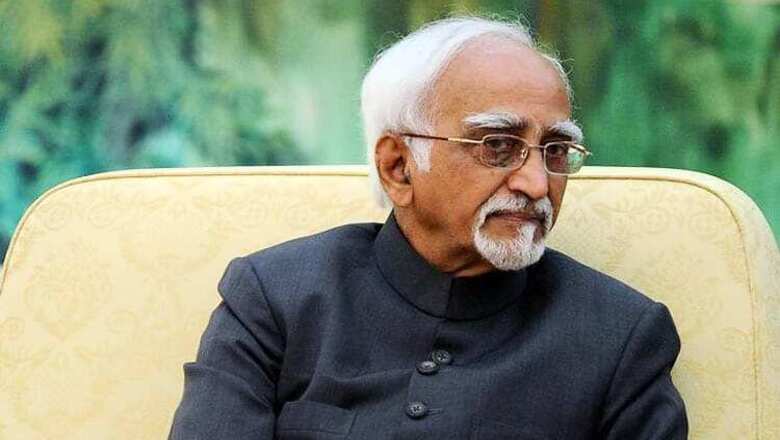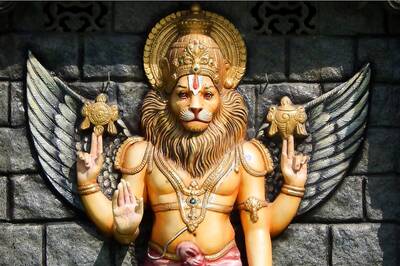
views
Amidst the din of rabble-rousers and propagandists, masquerading as opinion makers, undoubtedly the Vice President of India Hamid Ansari would be one among the select, few voices that carry credibility, logic, civility and a sense of clarity in our country. So his recent submissions at the golden jubilee session of the All India Muslim Majlis-e-Mushawarat in New Delhi ought to be taken very seriously by the government.
The most important point that was made by VP Ansari was that the slogan of “Sabka Saath, Sabka Vikas” coined by the Narendra Modi government, was indeed laudable, but the “default by the State or its agents” in terms of deprivation, exclusion and discrimination, including failure to provide security needed to be corrected by the State. He floated the need for “affirmative action” to ensure a common starting point for Muslims too. Let us examine what prompted him to make those statements in the first place, purely through the spectrum of hard facts, that evidence the overwhelming discrimination faced by Indian Muslims.
In every sphere of life, the Indian Muslim faces an uphill challenge, the extent of which is borne out by several independent reports. Take education for example. Today, just four out of 100 Muslims above the age of 20 are graduates. With literacy levels below the national average and dropout rates higher (A Jamia Milia Islamia report suggests that it has shot up to 50% in class 8 and 9) than the national average, limited access to schools and skill development, the Indian Muslim is hardly equipped to be viable in the job market.
Consequently, that is hampering his or her chances in the employment market. A study shows that in the secondary and tertiary sector, the share of Muslims between 16 and 64 years of age in regular and casual employment is lower than that of SCs and STs. In the public sector, the situation is equally dismal, with Muslims having a share of just 2.5 per cent in the civil services. As per the Kundu report, synopsis of which is available online there is a whopping 18% joblessness among educated urban Muslim youth!
Most Muslims are therefore forced to start their own small ventures and business and become entrepreneurs but without adequate capital and resources, these can hardly grow into big, sustainable enterprises. Data with respect to access to banking facilities and loans, particularly in public sector banks, also shows how Indian Muslims face difficulty in accessing much needed capital to make their ventures thrive.
The impact of this on the economic situation of the community is quite obvious. Among various religious groups, Muslims have the lowest living standard with an average per capita expenditure of just Rs. 32.66 per day as per a NSSO study. The Sikh community with an average per capita spending of Rs. 55.30 per day, Hindus with Rs. 37.50 and Christians with Rs. 51.43 per day are in a relatively much better position. The Kundu report has also added that poverty amongst Muslim in urban areas was twice the national average in 2011-12 and four times more than among upper caste Hindus.
The VP Ansari rightly pointed out that one of the principal problems facing the community, apart from this, was one of identity and security. He hit the nail on the head when he said that Indian Muslims were often “made to carry, unfairly, the burden of political events and compromises that resulted in the Partition. This is evident from the manner in which the discourse and narrative has been shaping up since May 2014 too.
The emboldening of those who want to convert India into a “Hindu Rashtra”, the unabating language of communal hate and poison, being spewed not just by fringe elements like the VHP, Bajrang Dal but by ministers and MPs, who form part of the Modi government including Giriraj Singh, Sadhvi Jyoti, Yogi Adityanath and Sakshi Maharaj. This atmosphere of intimidation of minorities juxtaposed with the Home Ministry report that communal violence in 2015, across India, saw a 25% increase as compared to same period in 2014 (January to June), raises troubling questions.
Today, the mainstream media discourse on Muslims is turning out to be just as immature and frivolous, as the one on social media where every rational counter-view is termed as “sickular” or “minority appeasement” just like every Muslim is automatically labeled and viewed as an “ISIS supporting Love-Jihadi!”
The hypocrisy doesn’t end there. If some communities feel so wronged by a Mughal ruler that they seek justice by erasing his name from a road hundreds of years after his death, or talk about minority rights in Bangladesh and Pakistan, then why should they be blind to the demands for justice by the minority community here in cases of riots that have taken place just 13 years ago? If there is justification to demand the hanging of a convict for Mumbai Blasts, isn’t there a justification to ensure the conviction of culprits in the Mumbai riots, Hashimpura massacre or Gujarat riots? Isn’t it a fact that the wheels of justice have moved slowly in some cases and quickly in some others?
Part of the dismal conditions faced by Muslims on the socio-economic, identity and security front can be traced to the lack of political representation and voice they command. My study shows that Muslim representation went down to a historic low of 22 seats in 2014 Lok Sabha polls when proportionally speaking they should have had 77 seats in the 16th Lok Sabha. Thus, the under-representation rate stands at a whopping 71.42 per cent for Indian Muslims.
In fact, the under-representation of Muslims has always been above 40% in every Loksabha election since Independence. Political under-representation of Muslims exceeds 50 per cent in states like Rajasthan, Gujarat, Delhi, Maharashtra, Madhya Pradesh and Tamil Nadu too when one takes a look at the Muslim representation in state assemblies. Since 1947 we have had just five Muslim chief ministers in states other than Jammu and Kashmir. Of them, only one has ever completed a five year term and the last Muslim to become a Chief Minister of a state other than J&K was in 1982!
Sachar Committee report had also pointed that how matters were made worse by reserving several Muslim majority seats for Scheduled Castes even though the SC population out there was far less than the SC population in other constituencies. This too, played its role in denying several MPs from the community a valid chance to get elected.
The VP Ansari rightly asks about the “autonomous effort by the community itself in regard to its identified shortcomings”. The truth is that Muslim community has lacked leadership of the kind that it ought to have had. Most leaders, have been happier playing the role of a “rubber stamp Muslim”, compromising the interests and rights of the community for petty self gain. Quite a few have been cynical practioners of a brand of identity politics that should have no place in a modern, democratic India. It would be a good time for the community to re-assess what kind of leaders it wants. Will these leaders help in creating a new narrative for the community in terms of addressing the various socio-economic problems confronting them? Will they work within the system to find long term solutions to problems like unemployment, under-representation and illiteracy? Will they have the courage to stand up to the conservative sections of the community that speaks an archaic and unacceptable language when it comes to women’s rights?
More importantly, will the State, especially one that talks about “Sabka Vikas” be open to the idea, given such overwhelming evidence, to bring Muslims into the mainstream through innovative tools like Equal Opportunity Commissions and Affirmative Action? These tools are a must for securing the promises of equal opportunity and fairness that have been made to every Indian, irrespective of his caste and creed, in the very Preamble to the constitution. Is it unfair of the Indian Muslim to seek legitimate affirmative action, scholarships, etc only for its economically weaker sections when even the most forward, socio-economically empowered communities in India demand full-scale reservation solely on the basis of their caste! Isn’t that hypocrisy? Should the Muslim be ignored merely because he does not indulge in violence and demagoguery like Hardik Patel or others?
I am glad that these questions have been raised by somebody like Hamid Ansari. It is time that the Indian state and media answers these questions honestly and appropriately. With 65% of its population under 35 years of age, the growing frustrations of Indian Muslims must not be taken lightly by ruling elites. If dealing with a semi-literate, inarticulate and vague Hardik Patel seems difficult, the State would really not want to take the risk of dealing with a Haider Pathan, with far more legitimate angst, on its streets.
(The article represents the personal views of the author and not that of IBNLive/CNN-IBN)

















Comments
0 comment